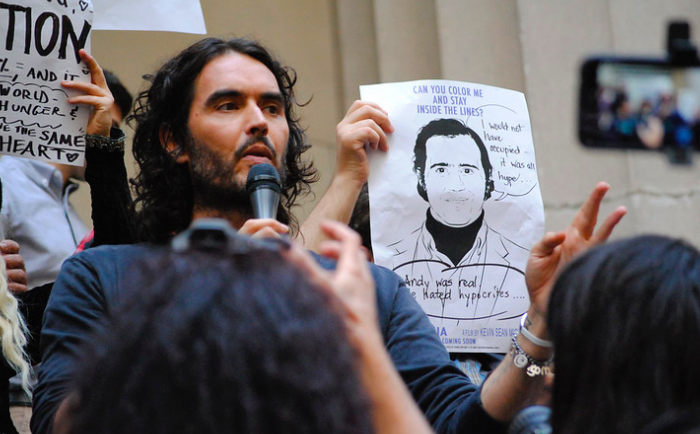I don’t tend to be interested in famous people, so why do I like Russell Brand?
This isn’t the article I’d been planning to write. I had planned to write about reactivity being related to pain and responses being related to love. I had an example in mind, about Russell Brand, and then I got completely sidetracked by the man himself.
I’ve been a big fan of Russell Brand for years now. In the UK, at least, it seems as though he’s been reflecting the zeitgeist of a less than hidden counter-culture back at us for a couple of decades.
He was a star of MTV and various programmes on UK TV. He dragged the tail end of the hedonistic 90s—well, hedonistic for me—into the noughties pushing that party rave culture into the early part of the new millennium. Taking it to extreme places that the rest of us, around the same age as him, just couldn’t risk or afford to keep going to.
When that took a toll on him—that even he couldn’t sustain—he got clean and reformatted his exploits into a stand-up comedy show and similarly moved his over-the-top persona onto the radio. On air, he pushed the boundaries so much—sometimes with horrible emotional results for individuals—that he got fired. It wasn’t great and a lot of people didn’t like him much at that point.
Around the late noughties, he had started to get roles in Hollywood, making a name for himself and churning out a number of, what I consider, run of the mill films. But he was becoming pretty famous, even outside of the UK, and he was turning heads. He even married Katy Perry.
Brand was extremely busy with his life in the UK and the US, but it was becoming clear to outside observers that he was dissatisfied with fame and everything it brought. There were fights with photographers and arguments in the media. None of it did anything for him and he wanted change. It seems that Katy Perry wanted to continue down the singing and fame route; Russell’s ideas weren’t for her, and the couple divorced.
In the early part of the last decade, Russell slowly moved into the political sphere and became an activist. He was honest about his own experiences of extreme poverty, addiction, and then fame and wealth. He used his past as a way to start questioning what the hell all this capitalist mantra really was all about and became a figurehead for everyone who felt the same. Who really gains from it? Is it the majority or is it a super-rich minority? He kept asking questions.
As he developed a persona, in which he was heavily involved in discussing politics on UK television, he never made moves to become a politician himself. There were podcasts, interviews on serious news programmes, a YouTube channel dedicated to the truthful analysis of politics and life as he saw it, and finally a book called Revolution. All the time poking the ruling classes asking what they do for us from the outside.
Whilst I don’t think he was wrong about a lot of what he said, during this time he gave the impression that he was awakened to the way things were, but most people weren’t. As was if, without his help, the majority of people wouldn’t be able to see the truth for themselves.
Nick Cohen from the Observer labelled his book Revolution “smug.” His stand up show, at the time, wasn’t based on politics as such, but it’s no surprise that he called it “Messiah Complex.” Almost as if he could see where his behaviour in the political world was taking him, but he just kept going. At the end of 2013, it culminated in him telling the UK population not to vote in the next election. He explained that he wasn’t voting out of exhaustion of the lies told by the establishment. The press went for the throat, ridiculing him at every opportunity.
He went fairly quiet for a short period of time—maybe a year and a half if memory serves—but when he reappeared, he had reinvented himself again. He was now a person on a spiritual journey of self-discovery.
His podcasts continued and they, much like his stand-up comedy, started to cover his understanding of himself. Rather than for laughs, he used his life to learn from. He talked about what had driven his past and current behaviours and how that he was beginning to be able to step back and become the observer of his inner life.
Bit by bit, he unpacked his life for all to see as he came to have new insights about his life and all the things he’d done.
As Russell expressed his life more often in terms of spirituality, he expanded his podcasts rebranding them as “Under the Skin,” to include interviews with a wide variety of meditators, mystics, scientists, comedians, and all types of people. He used these individuals to bounce his ideas off, testing them out, and seemed to actively learn from their words of wisdom so that he could further his own journey toward a kind of awakening.
He didn’t disengage completely from politics; he retracted his call not to vote, and furthermore, people from the fringes of the political world appeared on his podcasts or his YouTube channel. But he stopped, giving the impression that he was a solution, rather he had become part of the conversation that we all need to have about the way the world is run and who benefits from it.
And that is much how he’s continued until this day. Slowly learning—always doing so in public—as honestly as he can.
I am not the sort of person to be a fan of anyone in particular, so why is it that I like Russell Brand?
Throughout his career, he’s done things that I’m not greatly interested in—like his films—and some actions I didn’t like, such as how he tricked people or treated them as a subject of ridicule on his radio programme. Another celebrity living by different rules and telling us how life should be. Normally I would dislike someone who does that, but despite that, I’m a keen observer of Russell Brand. More so now, than ever before.
What I like about Russell Brand is that, whilst he may not have been awake to what was happening in the middle of any storm, such as his drug addiction or his almost megalomania that drove him into the world of politics, he is a man who is capable of finally catching a breath: stopping, looking back, and learning from the mistakes he’s made.
More than that, and for me, the most important thing is his public honesty about the mistakes he’s made.
Rather than be repelled by them, he embraces them and uses them in an effort to change. He doesn’t cover up his drug addiction or the other emotional addictions to sex and relationships that he recognized once he was clean—instead, he is willing to talk about it and be open about how he works with these traits to become a better person.
He’s been that way as long as I’ve been aware of his existence. Even now, when he’s trying to add positivity to the world, he will laugh about how his ego has taken over and use it as another teacher for both himself and anyone who wishes to listen and learn.
Think about your own life; what sort of person means the most to you?
Is it the perfect person who seems to be doing all the right things at all times but keeps everyone at arm’s length afraid of someone seeing the real them? Or is it the imperfect person who tries and gets things wrong; sometimes greatly wrong, but they admit their errors, apologises when necessary, and tries to do better next time?
I know both types of people and I am always drawn to the imperfect but honest person who is learning, adapting to their traits and working with them, and always trying to be the best they can be—even when they’re not.
And I suppose that is exactly why I respect and listen to Russell Brand. He’s imperfect, but he’s honest, and he’s always been that way.


 Share on bsky
Share on bsky





Read 12 comments and reply